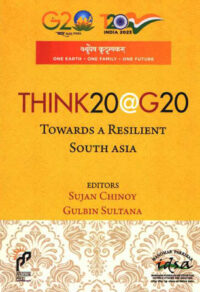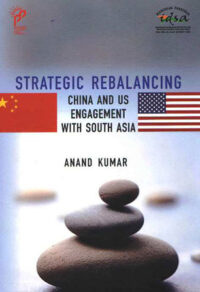Achieving Regional Economic Integration in South Asia
- Publisher: Pentagon Press
South Asia, home to nearly 1.9 billion people, remains one of the least integrated regions globally, despite its enormous economic potential and shared cultural ties. In an era where regional cooperation is vital for achieving sustained growth and addressing common challenges, South Asia lags behind other regions in terms of trade, investment, and cross-border connectivity.
Achieving Regional Economic Integration in South Asia explores the barriers that have historically hindered economic cooperation in the region, from political tensions and infrastructure deficits to regulatory obstacles and economic asymmetries. This edited volume brings together leading scholars and policymakers to analyze these challenges and offer actionable solutions. Covering critical areas such as trade liberalization, energy cooperation, digital connectivity, and the role of external actors, the book provides a comprehensive roadmap for fostering deeper economic ties among South Asian nations.
Drawing on lessons from other successful regional blocs such as ASEAN and the European Union, this volume highlights how economic integration can enhance regional stability, promote growth, and lift millions out of poverty. It is an essential resource for anyone interested in South Asia`s economic future and the pathways to greater regional cooperation.
- ISBN: 9788198285782 ,
- Price: ₹ 1995/-
- E-copy available
Afghans in Need: Positing India’s Continued Engagement With Afghanistan
With the leaders of the Taliban regime making a concerted effort to reach out to India, and India making it clear that it will remain committed to the people of Afghanistan, the ground appears to have been laid for engagement based on a working understanding on mutual “non-interference” and “non-threat”. However, the challenge lies in building trust between the two sides.
THINK20@G20: Towards A Resilient South Asia
- Publisher: Pentagon Press
India’s G20 Presidency, based on the principle of inclusivity, gave special importance to the priorities of the Global South. The Think20 engagement group (T20), the ‘Ideas Bank’ for the G20, played a crucial role in connecting scholars and experts to harness ideas to enrich the G20 agenda and benefit the larger global community. One of the endeavours in this regard was to gather the perspectives of South Asian countries during India’s G20 Presidency, using the collection of speeches and select papers presented during the 14th South Asia Conference organised by the Manohar Parrikar Institute for Defence Studies and Analyses on 17-18 January 2023. This volume provides various national perspectives on some of the crucial non-traditional issues confronting South Asian countries, including Myanmar, and well-researched ideas to deal with those challenges effectively. It contextualises the role of India as G20 President, and beyond, in addressing some of the pressing regional issues.
- ISBN: 9788197198601 ,
- Price: ₹ 1295/-
- E-copy available
Strategic Rebalancing: China and Us Engagement with South Asia
- Publisher: Pentagon Press
The relationship between China, the US, and South Asia holds significant implications for global politics and security dynamics due to several reasons. South Asia is strategically located at the crossroads of major global trade routes, making it crucial for regional stability and economic prosperity. Its geopolitical significance is further amplified by its proximity to the Indian Ocean, a vital maritime corridor for global commerce. As such, any developments in South Asia have far-reaching consequences for international trade and security.
China’s rapid economic ascent and expanding influence in South Asia has altered the traditional power dynamics in the region. With its ambitious Belt and Road Initiative (BRI), China has invested heavily in infrastructure projects across South Asia, enhancing connectivity and economic ties. This has enabled China to assert itself as a major player in the region, challenging the influence traditionally held by the US and other Western powers.
This book delves into the intricate relationship between China`s rise and US engagement with South Asia, addressing several key questions. First, it explores how China`s rise as a major power has influenced US involvement in South Asia. Additionally, it investigates the significance of South Asia in the broader strategic calculations of the US. Finally, it examines how evolving geopolitical dynamics shape American strategies in the region.
This book provides a comprehensive analysis of the intricate relationship between the US, China, and South Asia, offering insights into the geopolitical shifts and strategic considerations that have shaped the region`s dynamics.
- ISBN: 9788197198618,
- Price: ₹ 1295/-
Discerning India’s Kashmir Strategy: Approach, Challenges and Outcomes
The annulment of Article 370 on 5 August 2019 is considered a watershed in the seven-decade long history of India's approach towards Kashmir. The rescinding of a separate special status and, subsequently, the endorsement by the Supreme Court verdict on 11 December 2023 marked the culmination of India's long haul project to constitutionally absorb the former princely State of Jammu and Kashmir.
Pakistan Occupied Kashmir: Politics, Parties and Personalities
- Publisher: Pentagon Press
This book is a rersult of research undertaken on the subject by the scholars associated with the IDSA project on Pakistan Occupied Kashmir (PoK) - also known as Pakistan Occupied Jammu & Kashmir (PoJK) - Which includes both the so-called "Azad Jammu and Kashmir (AJK)" and Gilgit-Baltistan (GB), was legally a part of the erstwhile princely state of Jammu and Kahmir, which acceded to India in October 1947. The authors of this book seek to provide a critical analysis of the politics of the above mentioned two regions within PoK; throw light on the genesis and evolution of various political parties and interest groups, and acquaint the readers with different pesonalities playing important role in politics therein. The main aim of the publication is to help the scholars, analysts, and policy-makers to understand the dynamics of the political systems in PoK, the complex interaction of these systems with the government in Islamabad and the responses of the local leadership to Pakistan's strateghy of keeping them under strict control in the name of representative governance over the last 70 years.
- ISBN: 978-93-86618-67-2,
- Price: ₹1495/-
- E-copy available

















